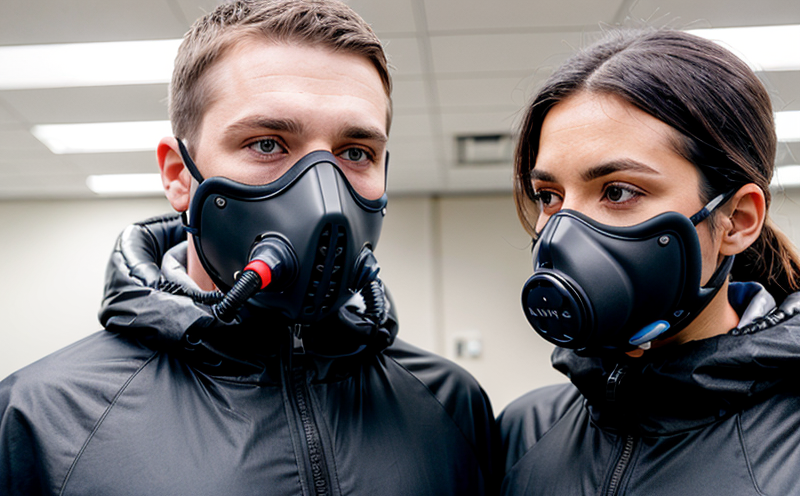EN 14593-1 Airline Respirator Strength Testing
The European Standard EN 14593-1 specifies requirements for airline respirators intended to protect passengers and crew against inhaling harmful substances in the cabin air. This standard covers various tests including strength testing, which ensures that the respirator can withstand typical operational stresses without compromising its integrity.
Strength testing is crucial because it ensures that the materials used in the construction of the respirator are robust enough to maintain their protective function under stress. The test involves subjecting a sample of the respirator to specific mechanical forces and monitoring its behavior until failure or deformation occurs. This helps manufacturers ensure that their products meet stringent safety standards set by regulatory bodies like the European Union.
The testing procedure typically includes:
- Sample preparation: Ensuring the sample is representative of the production batch, free from defects, and properly cleaned.
- Application of mechanical forces: Using calibrated equipment to apply defined loads or stresses on different parts of the respirator (e.g., head straps, exhalation valves).
- Data recording: Monitoring deformation points and failure modes.
The goal is to ensure that the respirators can withstand the rigors of use in an airline environment without compromising their protective capabilities. This testing ensures that airlines comply with safety regulations while also protecting passengers and crew from potential risks associated with airborne contaminants.
Real-world applications include ensuring that new models of airline respirators meet stringent durability requirements before being put into service. The test results are critical for quality assurance teams to verify product compliance with EN 14593-1, thereby safeguarding the health and safety of all stakeholders involved in air travel.
For research and development (R&D) engineers, this testing provides valuable insights into material performance under stress conditions. This information can be used to improve future designs by identifying weak points in current models or exploring new materials for enhanced durability. Compliance officers benefit from having clear evidence that their products meet the necessary safety standards, which is essential for maintaining a positive brand reputation and regulatory compliance.
Eurolab Advantages
At Eurolab, we pride ourselves on providing high-quality testing services tailored to meet the needs of our clients. Our expertise in respiratory protection testing ensures that you receive accurate, reliable results that comply with international standards such as EN 14593-1.
- State-of-the-art equipment: We use cutting-edge instrumentation and software to conduct thorough strength tests on airline respirators.
- Experienced professionals: Our team comprises highly trained technicians who understand the nuances of respiratory protection testing.
- Comprehensive reporting: All test results are documented meticulously, providing a clear understanding of performance under various stress conditions.
- Dedicated support: We offer personalized assistance to ensure that your requirements are met efficiently and effectively.
Choose Eurolab for all your respiratory protection testing needs. Trust us to deliver accurate, reliable results that meet the highest industry standards.
Quality and Reliability Assurance
At Eurolab, we take pride in delivering consistent, high-quality test results that are both accurate and reliable. Our commitment to quality is reflected in our adherence to international standards such as EN 14593-1 for airline respirator strength testing.
We ensure that every aspect of the testing process adheres strictly to these guidelines, from sample preparation to final reporting. This meticulous approach guarantees that clients receive results they can trust and act upon confidently. Our rigorous quality control measures help maintain consistency across all tests, ensuring that each result is accurate and repeatable.
The reliability of our services is further enhanced by our use of advanced equipment and experienced personnel. These factors contribute to the precision and accuracy required for airline respirator strength testing. By choosing Eurolab, you can be assured that your products will meet or exceed all relevant standards, thereby enhancing safety within your organization.
Our dedication to quality extends beyond just meeting regulatory requirements; it encompasses continuous improvement through feedback from clients and staying updated with the latest technological advancements in the field of respiratory protection testing. This ensures that we remain at the forefront of providing top-notch service.
International Acceptance and Recognition
The European Standard EN 14593-1 for airline respirators has gained significant international acceptance, including recognition by organizations such as the International Organization for Standardization (ISO). This standard is widely adopted in Europe but also respected globally due to its stringent requirements for respiratory protection devices.
- ISO/IEC 17025: Eurolab complies with this international accreditation, ensuring that our testing services meet the highest standards of accuracy and reliability. This compliance is crucial for gaining acceptance in markets around the world.
- Aerospace Industry Recognition: Many leading aerospace companies worldwide recognize EN 14593-1 as a benchmark for quality when selecting suppliers.
- Regulatory Bodies: Numerous regulatory bodies globally, including those outside Europe, have adopted similar standards or adapted them into their own frameworks. This widespread adoption underscores the importance and validity of these standards.
The international acceptance of EN 14593-1 reflects its role in promoting safety and reducing risks associated with respiratory protection devices used in various environments. By adhering to this standard, manufacturers can ensure that their products are not only compliant but also meet the expectations of a global market.





